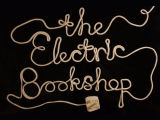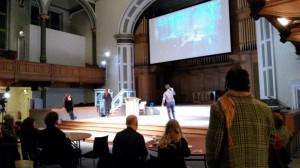 On Thursday, October 16th was the 4th birthday of the Electric Bookshop. They celebrated it with an event in Edinburgh in which attendants could enjoy wine, cupcakes and three wonderful speakers. At the beginning of the evening, the members of the organisation of the Electric bookshop, Claire Stewart, Peggy Hughes and Padmini Ray Murray, discussed what their favourite moments of the year were. Primarely, for new comers as me, this was very helpful to know more about what they focus on. The organisation holds events to congregate people from various fields: technology, publishing, design and literature. As intimidating as this mixture might sound, they can be proud for having a big participation in their debates.
On Thursday, October 16th was the 4th birthday of the Electric Bookshop. They celebrated it with an event in Edinburgh in which attendants could enjoy wine, cupcakes and three wonderful speakers. At the beginning of the evening, the members of the organisation of the Electric bookshop, Claire Stewart, Peggy Hughes and Padmini Ray Murray, discussed what their favourite moments of the year were. Primarely, for new comers as me, this was very helpful to know more about what they focus on. The organisation holds events to congregate people from various fields: technology, publishing, design and literature. As intimidating as this mixture might sound, they can be proud for having a big participation in their debates.
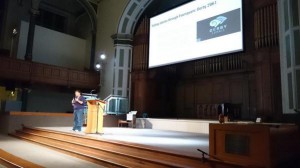 The first speaker to participate was Kate Ho, Managing Director of Interface3, which designs and exciting customer branded experiences using innovative technologies (such as Augmented Reality, Mobile Games). At the moment, Kate Ho is focusing on educational games, and she spoke about her project Stobhill, a 3D interactive experience based on Edwin Morgan’s poem with the same name. The game is set in a scary abandoned hospital that shares the name with the title. The players are supposed to use the audio of three people and their stories related to the building to work on their achievements in the game, and so find about the disturbing plot and terrorific resolution.
The first speaker to participate was Kate Ho, Managing Director of Interface3, which designs and exciting customer branded experiences using innovative technologies (such as Augmented Reality, Mobile Games). At the moment, Kate Ho is focusing on educational games, and she spoke about her project Stobhill, a 3D interactive experience based on Edwin Morgan’s poem with the same name. The game is set in a scary abandoned hospital that shares the name with the title. The players are supposed to use the audio of three people and their stories related to the building to work on their achievements in the game, and so find about the disturbing plot and terrorific resolution.
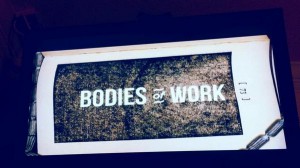 The second speaker who took part in the event was Alan Trotter. He is a writer from Aberdeen, winner of the Sceptre Prize for emerging writers and currently studying his PhD in University of Glasgow, researching for his project called Bodies of work: unusual uses of the physical form of the book. His work is characteristic for his study on the difference between printed text and text on the screen (HTML). In his participation, he talked about the play with form and this web-experiment he is working on.
The second speaker who took part in the event was Alan Trotter. He is a writer from Aberdeen, winner of the Sceptre Prize for emerging writers and currently studying his PhD in University of Glasgow, researching for his project called Bodies of work: unusual uses of the physical form of the book. His work is characteristic for his study on the difference between printed text and text on the screen (HTML). In his participation, he talked about the play with form and this web-experiment he is working on.
The last speaker in the evening was Rob Morgan. Unfortunately, he couldn’t attend the event physically, but when the venue is organised by technology geeks, there’s always a way to sort out difficulties, so we could enjoy of his participation through Skype. Rob Morgan is a game writer, narrative designer and voice director. His participation was about the control and content of the player in a videogame, since this is very different from those in books. Fi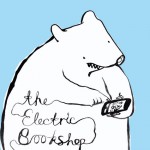 rst, he discussed how the player interacts in the game, how he can control the story and the plot, but also how some games don’t give the player any choices to develop the plot in the game. Regarding the content of a game, he also explained how to create characters that the players can be identified with, how to make it exciting and interesting so the player can work on the development of the character, since he is the one in control of the storyline in the videogame.
rst, he discussed how the player interacts in the game, how he can control the story and the plot, but also how some games don’t give the player any choices to develop the plot in the game. Regarding the content of a game, he also explained how to create characters that the players can be identified with, how to make it exciting and interesting so the player can work on the development of the character, since he is the one in control of the storyline in the videogame.
This event clearly brought together different fields that, actually, work together most of the times. At the same time, it also was enlightening to learn more about how technology, set in the modern world, and literature, existing since ancient ages, come along so well together.

